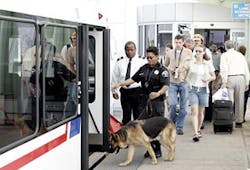Missouri Tightens Airport Security Following London Explosions
ST. LOUIS (AP) -- Security was tight at airports and other mass transportation systems across Missouri Thursday following explosions at subway trains and a double-decker bus in London.
The Department of Homeland Security has not raised the threat level in the United States, even though an al-Qaida cell is claiming responsibility for the London attacks.
Still, officials in Missouri were taking extra precautions.
Bomb-sniffing dogs were checking MetroLink light rail trains in the St. Louis area. Security in uniform and in plain clothes were on the trains, but they always are, said Dianne Williams, a spokeswoman for Metro, which operates the mass transit system in St. Louis.
She urged passengers to help out by keeping reporting any suspicious activity.
''Law enforcement and Metro security have been in touch, coordinating efforts in Missouri and Illinois and with Homeland Security,'' Williams said. ''Everybody's talking to each other around what measures need to be taken.''
A spokeswoman at Lambert Airport said passengers will see more uniformed airport police in the terminals. Other measures are being taken but will not be obvious to the public, spokeswoman Sandy Singer said.
At Kansas City International Airport, bomb-sniffing dogs were checking bags and extra patrols were on duty, spokesman Joe McBride said.
In Jefferson City, Capitol Police said they are being more vigilant, but have not added levels of security. After the Sept. 11, 2001, terrorist attacks, metal detectors were installed. They were later taken out, and officials say there are no plans to reinstall them
Dr. Sam Kiger, director of the Center for Explosion-Resistant Design at the University of Missouri-Columbia, conducts anti-terrorism research on lessening the vulnerability of structures.
He said transit systems are particularly difficult to protect because they're so accessible. He said the best way to protect people from explosions in a building is to create a ''standoff distance,'' to allow shock waves to dissipate.
''But with transit systems, you can't get that standoff distance,'' he said. ''It's not practical to enforce.''
He said Missouri researchers and others around the country are ''actively researching'' that problem.
